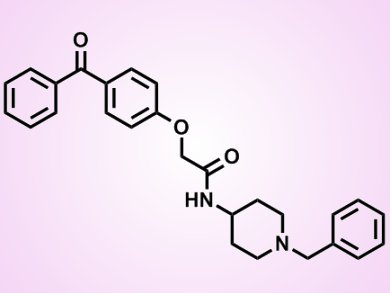Obesity causes insulin resistance, a condition where the body does not respond to the physiological action of insulin. As this metabolic hormone promotes the absorption of glucose from the circulation, obese patients accumulate glucose in their blood, ultimately developing diabetes and cardiovascular diseases.
Miki Okada-Iwabu, University of Tokyo, Japan, and colleagues discovered a molecule that might improve the health of these individuals. The researchers identified AdipoRon (pictured), an orally active synthetic molecule that activates the receptors for adiponectin. This protein promotes fatty-acid oxidation, thereby sensitizing cells to insulin´s action. As a consequence, when the researchers stimulated adiponectin activity with AdipoRon, they increased insulin sensitivity in mice fed with a high fat diet and lowered glucose levels in diabetic mice, thereby increasing their life span.
The use of AdipoRon is thus a promising strategy to treat obesity-related disorders, such as diabetes and insulin resistance.
- A small-molecule AdipoR agonist for type 2 diabetes and short life in obesity,
Miki Okada-Iwabu, Toshimasa Yamauchi, Masato Iwabu, Teruki Honma, Ken-ichi Hamagami, Koichi Matsuda, Mamiko Yamaguchi, Hiroaki Tanabe, Tomomi Kimura-Someya, Mikako Shirouzu, Hitomi Ogata, Kumpei Tokuyama, Kohjiro Ueki, Tetsuo Nagano, Akiko Tanaka, Shigeyuki Yokoyama, Takashi Kadowaki,
Nature 2013, 503, 493–499.
DOI: 10.1038/nature12656




